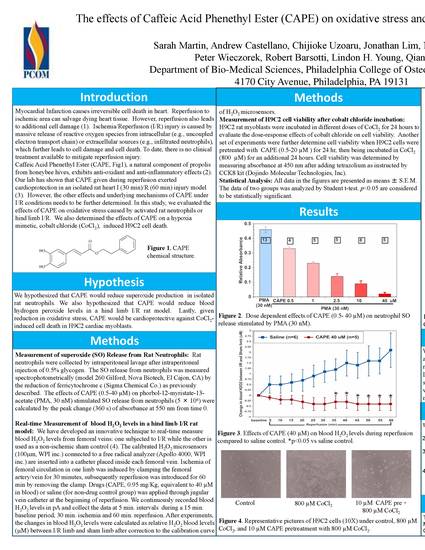
Oxidative stress has been implicated in pathogenesis of hypoxia and ischemia/reperfusion (I/R) injury. In previous studies, we have shown that the antioxidant CAPE exerted cardioprotection in an isolated rat heart I (30 min)/R (60 min) injury model. In this study, we further evaluated the effects of CAPE on oxidative stress and hypoxia-induced cell damage. We evaluated the inhibition of absorbance in the phorbol 12-myristate 13-acetate (30 nM) induced superoxide production spectrophotometrically in isolated rat neutrophils via reduction of exogenous cytochrome C. We found that CAPE (0.5 µM- 40 µM; n=4-13) reduced phorbol 12-myristate 13-acetate induced neutrophil superoxide release dose-dependently from 29±3% to 95±2%. In a rat hind limb I (30 min)/R (60 min) model, blood hydrogen peroxide levels serves as an indicator of blood oxidative stress and was measured in real-time via a hydrogen peroxide microsensor (100 μm) inserted into both femoral veins (one served as sham, the other as I/R). We found that in the control group, I/R significantly increased blood hydrogen peroxide levels to 2.1±0.8 μM relative to the sham limb at 60 minutes reperfusion when saline was given at the beginning of reperfusion (n=5). By contrast, CAPE when given at reperfusion (40 µM, n=5) significantly reduced blood hydrogen peroxide levels from 30 min reperfusion and throughout the rest of experiment (p
This study was supported by Division of Research and Department of Bio-Medical Sciences at Philadelphia College of Osteopathic Medicine.
Available at: http://works.bepress.com/lindon_young/58/
